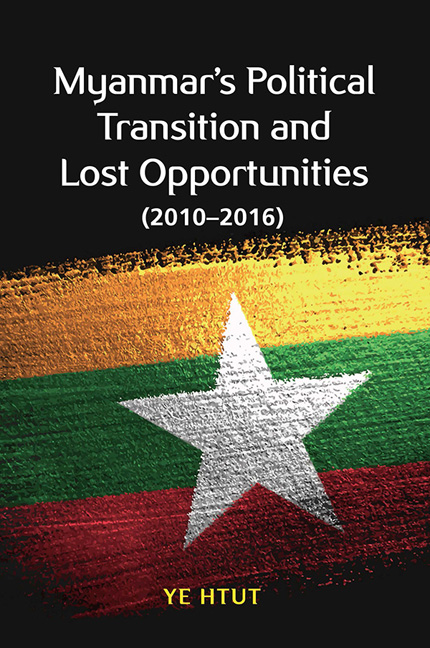Book contents
- Frontmatter
- Contents
- Foreword
- Acknowledgements
- Introduction: Myanmar's Political Reforms
- 1 The National Convention
- 2 The Constitution
- 3 The Union Solidarity and Development Party
- 4 Myanmar Spring and Aung San Suu Kyi
- 5 The Union Government
- 6 The Government and the Parliament
- 7 Shwe Mann's Checkmates
- 8 Turning Points
- 9 Media Reform
- Epilogue
- Appendix A President Thein Sein's Inaugural Address
- Appendix B President Thein Sein's First Address to the Cabinet
- List of Interviewees
- Index
- About the Author
- Plate section
- Frontmatter
- Contents
- Foreword
- Acknowledgements
- Introduction: Myanmar's Political Reforms
- 1 The National Convention
- 2 The Constitution
- 3 The Union Solidarity and Development Party
- 4 Myanmar Spring and Aung San Suu Kyi
- 5 The Union Government
- 6 The Government and the Parliament
- 7 Shwe Mann's Checkmates
- 8 Turning Points
- 9 Media Reform
- Epilogue
- Appendix A President Thein Sein's Inaugural Address
- Appendix B President Thein Sein's First Address to the Cabinet
- List of Interviewees
- Index
- About the Author
- Plate section
Summary
Senior General Than Shwe and other military leaders established a new political system under the 2008 constitution. The National Convention played an essential role in the drafting process. Although the military State Law and Order Restoration Council (SLORC) organized the National Convention, in 1989, prior to national elections the following year, the Tatmadaw (armed forces) had no intention of drawing up a new constitution.
After the military took power in 1988, SLORC chairman Senior General Saw Maung explained that the army government would not write a new constitution, and that it was the responsibility of the political parties that won the forthcoming national elections to do so. “The coming Pyithu Hluttaw will write and adopt a new constitution. After its adoption, power will be transferred to the constitutionally formed government”, he explained.
This position was clearly stated at the SLORC's 43rd press conference on 9 June 1989. The SLORC spokesperson said:
It has been said that power will be transferred to the government that will come into being in accordance with the law after the elections are held. Power could not be handed over immediately after the elections are held as government will have to be formed on the basis of a constitution. If power will be transferred hastily [without a proper procedure], it would lead to a shaky and weak government; any rational person can understand it. Only if the power is transferred to a government formed systematically on a basis of a constitution, will the government to be constituted be stable. We have two constitutions at present, namely the 1947 constitution and the 1974 constitution. If the Hluttaw members unanimously selected one of the two constitutions and formed a government then, power would be transferred to them. We are ready to transfer power to the government formed in accordance with the constitution. If both the constitutions are not acceptable, a new one should be written. The Tatmadaw will not draw up a new constitution. The SLORC will not do it either. The representatives elected are to draw it.
Although the SLORC promised to hold an election, it never explained that this election would be held under the previous, 1974 constitution. The 1947 constitution was abolished following the 1962 military coup and eventually replaced by the 1974 constitution. The election held in 1990 was for a single-house parliament as under the 1974 constitution.
- Type
- Chapter
- Information
- Publisher: ISEAS–Yusof Ishak InstitutePrint publication year: 2019

